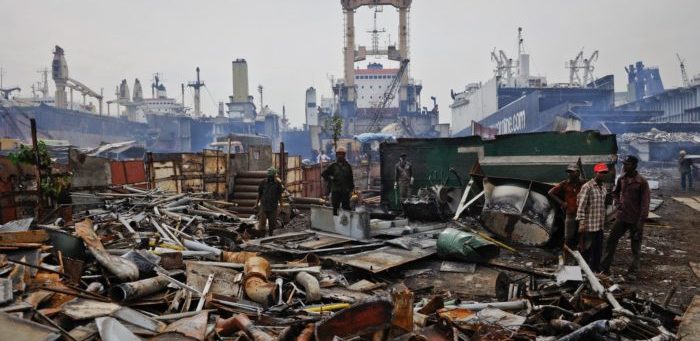ECSA has called industry to support responsible ship recycling in Alang following its recent trip to the country where it had the opportunity to witness first-hand the important investments made in a number of ship recycling yards to ensure compliance with the Hong Kong International Convention for the Safe and Environmentally Sound Recycling of Ships.
ECSA said that heavy investments have been made to place concrete flooring, effective drainage systems, appropriate downstream management and more decent housing.
“Alang and other places in South Asia have for years been criticised for poor standards – and rightly so, but, a positive development has begun and this should be supported not undermined”, said ECSA President Niels Smedegaard,
“Whilst there are yards where improvements are clearly necessary, others have already taken the lead in changing their recycling practices to reflect advanced modern standards.”
At European level, the EU Ship Recycling Regulation could prove to be a game-changer. If applied with a constructive and inclusive approach, the EU list for recycling yards could be the ‘carrot’ that enables a fundamental change in the way recycling is carried out globally.
“Unfortunately, the signals sent from the European Commission are all but encouraging”, said ECSA Secretary General Patrick Verhoeven,
“The guidelines on which recycling yards have to base their application do not differentiate between hazardous and non-hazardous waste which de facto excludes all yards in India, even the most advanced ones. We believe that this is disproportional and will simply discourage yards from making further investments to raise standards.”
ECSA fully supports the decision of several large shipowners to audit and assess for themselves the recycling practices in Alang.
“This is not a matter of lowering standards, but rather to the contrary a way of rewarding those recycling facilities that have now raised their standards to match those of leading shipowners”, concluded Patrick Verhoeven,
“By committing tonnage to responsible facilities in Alang, these shipowners also commit staff and resources to monitor and share best practices, effectively shaping the future of the region.”
For ECSA, the EU now stands at a very important crossroad as regards responsible ship recycling. It can either be an enabler of development and reward pioneering Indian yards by giving them a fair chance to be on the EU list or it can confirm the view of many EU-skeptics and completely ignore important global developments. The overall aim of the EU Regulation must be to improve the environmental and social conditions in the ship recycling industry. This cannot be done if the EU prohibits EU flagged vessels from supporting the positive development in leading yards.
Source: ECSA






























































